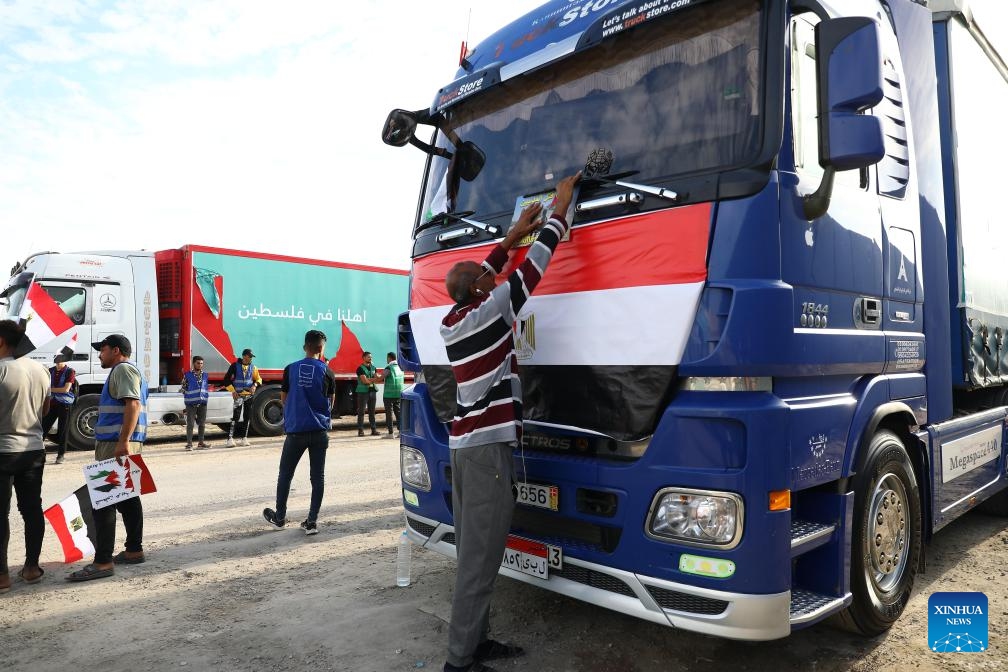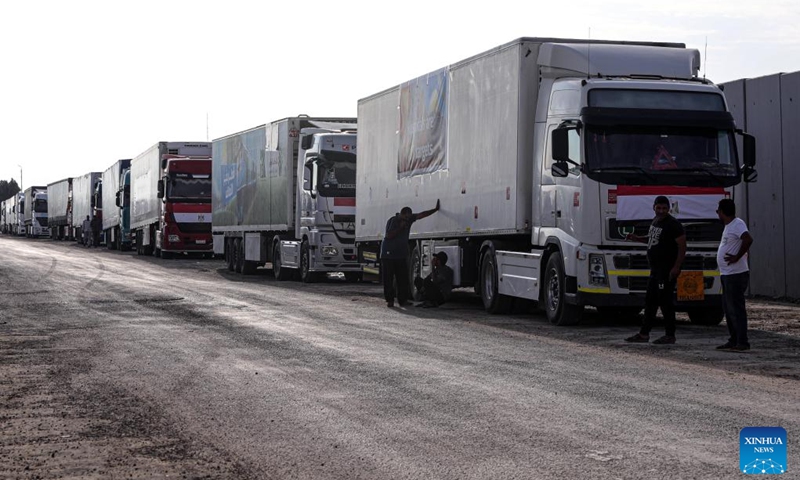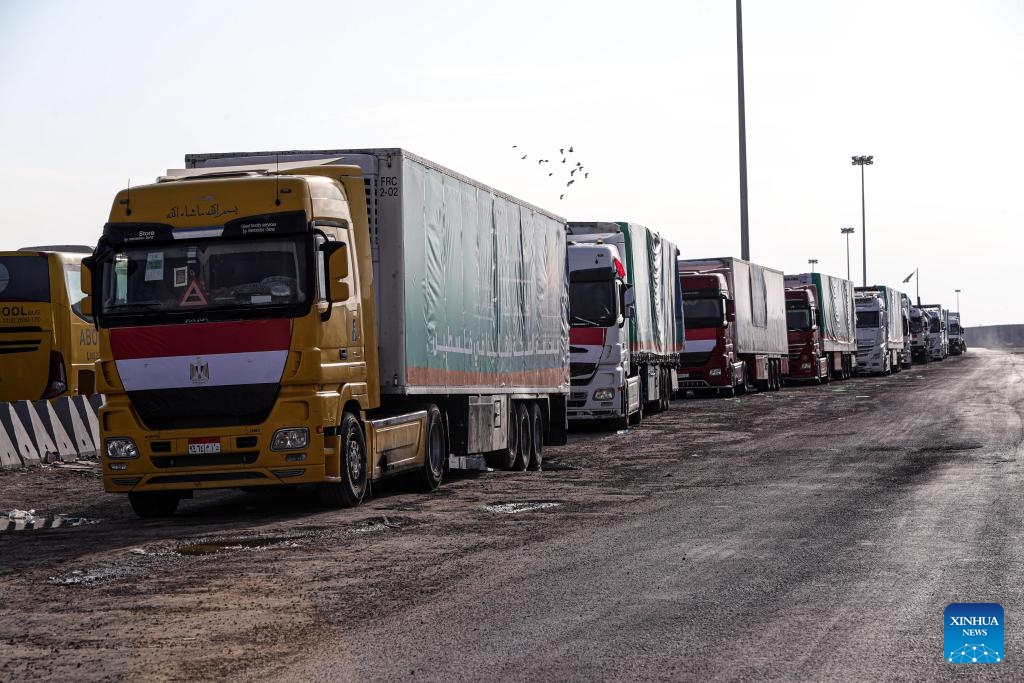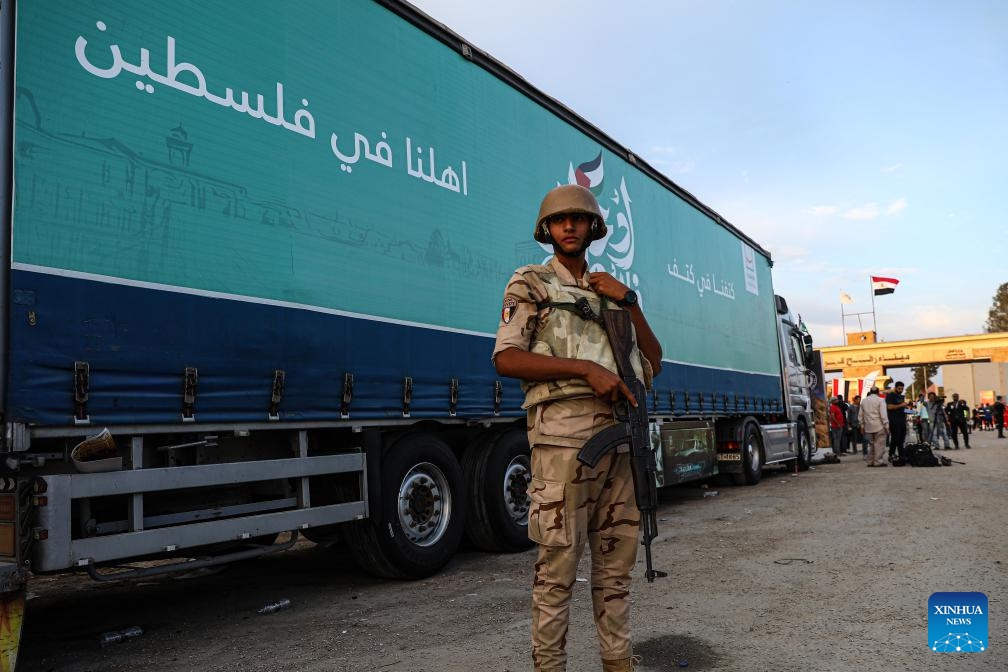
Trucks carrying relief aid line up to enter Gaza near the Egyptian side of the Rafah crossing, on Oct. 31, 2023. Hundreds of trucks carrying relief aid have waited for days at the Egyptian side of the Rafah crossing to enter the war-torn Gaza Strip, home to 2.3 million Palestinians who have been deprived of fuel, food, water and medical supplies for nearly three weeks under Israeli blockades.(Photo: Xinhua)

Trucks carrying relief aid line up to enter Gaza near the Egyptian side of the Rafah crossing, on Oct. 31, 2023. Hundreds of trucks carrying relief aid have waited for days at the Egyptian side of the Rafah crossing to enter the war-torn Gaza Strip, home to 2.3 million Palestinians who have been deprived of fuel, food, water and medical supplies for nearly three weeks under Israeli blockades.(Photo: Xinhua)

Trucks carrying relief aid line up to enter Gaza near the Egyptian side of the Rafah crossing, on Oct. 31, 2023. Hundreds of trucks carrying relief aid have waited for days at the Egyptian side of the Rafah crossing to enter the war-torn Gaza Strip, home to 2.3 million Palestinians who have been deprived of fuel, food, water and medical supplies for nearly three weeks under Israeli blockades.(Photo: Xinhua)

A soldier stands guard in front of a truck carrying relief aid near the Egyptian side of the Rafah crossing, on Oct. 31, 2023. Hundreds of trucks carrying relief aid have waited for days at the Egyptian side of the Rafah crossing to enter the war-torn Gaza Strip, home to 2.3 million Palestinians who have been deprived of fuel, food, water and medical supplies for nearly three weeks under Israeli blockades.(Photo: Xinhua)
Hundreds of trucks carrying relief aid have waited for days at the Egyptian side of the Rafah crossing to enter the war-torn Gaza Strip, home to 2.3 million Palestinians who have been deprived of fuel, food, water and medical supplies for nearly three weeks under Israeli blockades.
Although the number of aid-laden trucks entering Gaza has increased from 20 to 60 trucks in recent days, the amount still falls short of the 100 truckloads of goods needed daily, according to Egyptian authorities and the United Nations (UN).
Since the first convoy of humanitarian aid through Rafah on Oct. 21, two weeks after the broke out of the Israel-Hamas conflict, about 250 trucks carrying tons of supplies have entered the Palestinian territory, according to Egyptian official data.
On Saturday, Egypt accused Israel of the delayed delivery of humanitarian aid to Gaza by "creating hurdles" for convoys and imposing strict and slow-paced inspection measures.
Israel requires the aid convoys to be inspected first at the Israeli Nitzana Border Crossing with Egypt and then drive nearly 100 km to the Egyptian side of the Rafah crossing before entering Gaza, according to a statement by the Egyptian Foreign Ministry.
"I have been waiting here with dozens of drivers, some of us carrying medicines, others carrying food supplies. This aid is a donation from Egypt to the people of Gaza," Ahmed Ragab, an Egyptian truck driver in his 50s, told Xinhua while waiting at the Egyptian side of the Rafah crossing.
"We moved to Rafah immediately after the aid was prepared. Some of us were able to cross with their truck to the Palestinian side. I hope I will soon deliver this aid to the residents of the Gaza Strip who suffer from a great scarcity of all needs."
Ragab said the situation at the Egyptian side of the crossing is also dangerous as truck drivers can hear Israeli attacks, noting the Palestinian side of the crossing has been targeted several times.
"However, these attacks will not prevent us from being with the besieged people of Gaza, who are suffering from death, hunger, and fear these days," Ragab said, adding that the living conditions for the truck driver and aid workers are also harsh.
"We spend the night in our trucks, and now it's getting cold, but this is too slight a suffering compared with that of thousands of civilians, children, and women in the Gaza Strip who are exposed to continuous Israeli bombing, with dozens of them dying every day," he said.
Shihata Saber, a truck driver whose load had entered Gaza, said "I'm proud to be part of the covey. We are always ready to deliver aid to our brothers in Palestine."
"This is the least I could do for the defenseless people of Gaza ... we will not hesitate to send more aid to them," he added.
Several countries have already sent planes carrying relief aid, including Algeria, Kuwait, Iraq, Türkiye, and the United Arab Emirates, Bahrain, Tunisia, France, Denmark, Italy, Belgium, Venezuela as well as the United Nations agencies.
On Oct. 7, Hamas launched a surprise attack on Israeli cities and towns along the Gaza-Israel borderline, to which Israel responded with massive airstrikes on Gaza and punitive measures.
The ongoing Israel-Hamas conflict has killed more than 8,525 Palestinians and 1,400 Israelis, according to official figures from both sides. A total of 239 people were taken hostage during the Hamas attacks, according to the Israel Defense Forces.
